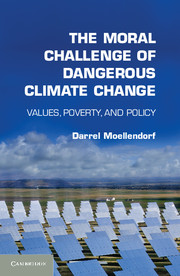Book contents
- Frontmatter
- Dedication
- Contents
- Acknowledgments
- Introduction
- 1 Danger, Poverty, and Human Dignity
- 2 The Value of Biodiversity
- 3 Risks, Uncertainties, and Precaution
- 4 Discounting the Future and the Morality in Climate Change Economics
- 5 The Right to Sustainable Development
- 6 Responsibility and Climate Change Policy
- 7 Urgency and Policy
- Afterword Frankenstorms
- Appendix A The Antipoverty Principle and the Non-Identity Problem
- Appendix B Climate Change and the Human Rights of Future Persons: Assessing Four Philosophical Challenges
- Appendix C The Right to Sustainable Development versus International Paretianism
- Appendix D Declaration on Climate Justice
- Bibliography
- Index
- References
2 - The Value of Biodiversity
Published online by Cambridge University Press: 05 June 2014
- Frontmatter
- Dedication
- Contents
- Acknowledgments
- Introduction
- 1 Danger, Poverty, and Human Dignity
- 2 The Value of Biodiversity
- 3 Risks, Uncertainties, and Precaution
- 4 Discounting the Future and the Morality in Climate Change Economics
- 5 The Right to Sustainable Development
- 6 Responsibility and Climate Change Policy
- 7 Urgency and Policy
- Afterword Frankenstorms
- Appendix A The Antipoverty Principle and the Non-Identity Problem
- Appendix B Climate Change and the Human Rights of Future Persons: Assessing Four Philosophical Challenges
- Appendix C The Right to Sustainable Development versus International Paretianism
- Appendix D Declaration on Climate Justice
- Bibliography
- Index
- References
Summary
“Sweet are the uses of adversity,
Which, like the toad, ugly and venomous,
Wears yet a precious jewel in his head.”
– William Shakespeare
In Chapter 1, my concern was with the identification of the danger that climate change poses to humans and our societies. When the risks of climate change are imposed on people who are impoverished, but there are mitigation alternatives that would avoid that, then climate change is dangerous and should, as a matter of morality, be avoided. The basis for this account of danger is the inherent dignity of persons and the ideal of taking one another as coauthors of the rules of our common life. At the end of Chapter 1, I noted that climate change raises other considerations of value that are not well understood according to the framework of that chapter. A pluralism about values comes to the fore as we attempt to understand what is at risk in our changing climate.
Climate scientists, ecologists, oceanographers, and field biologists tell us that nonhuman life is also in peril because of climate change. This is often represented by the iconic picture of the lonesome polar bear on a diminished ice sheet surrounded by frigid seas. Where will that bear go when the polar ice has melted? However, the danger that concerns scientists is not to that individual bear, but to Ursus maritimus, his species, and hundreds of thousands, maybe millions, of other species that comprise terrestrial biodiversity. The enormous diversity of species – what scientists refer to as “biodiversity” – will be compromised as ecosystems approach new equilibrium points caused by changing precipitation and storm patterns, adjustments to seasonal calendars, and altered mean temperatures. Species are, and will continue to be, under new stresses. In all likelihood a great many, perhaps a majority, will not survive.
- Type
- Chapter
- Information
- The Moral Challenge of Dangerous Climate ChangeValues, Poverty, and Policy, pp. 30 - 61Publisher: Cambridge University PressPrint publication year: 2014



